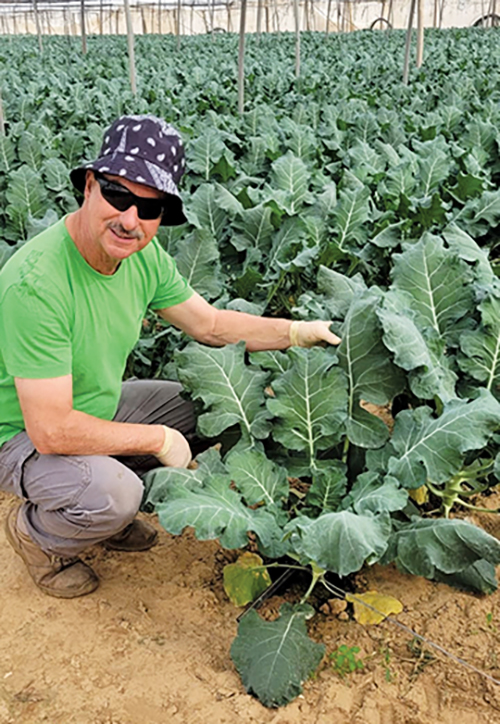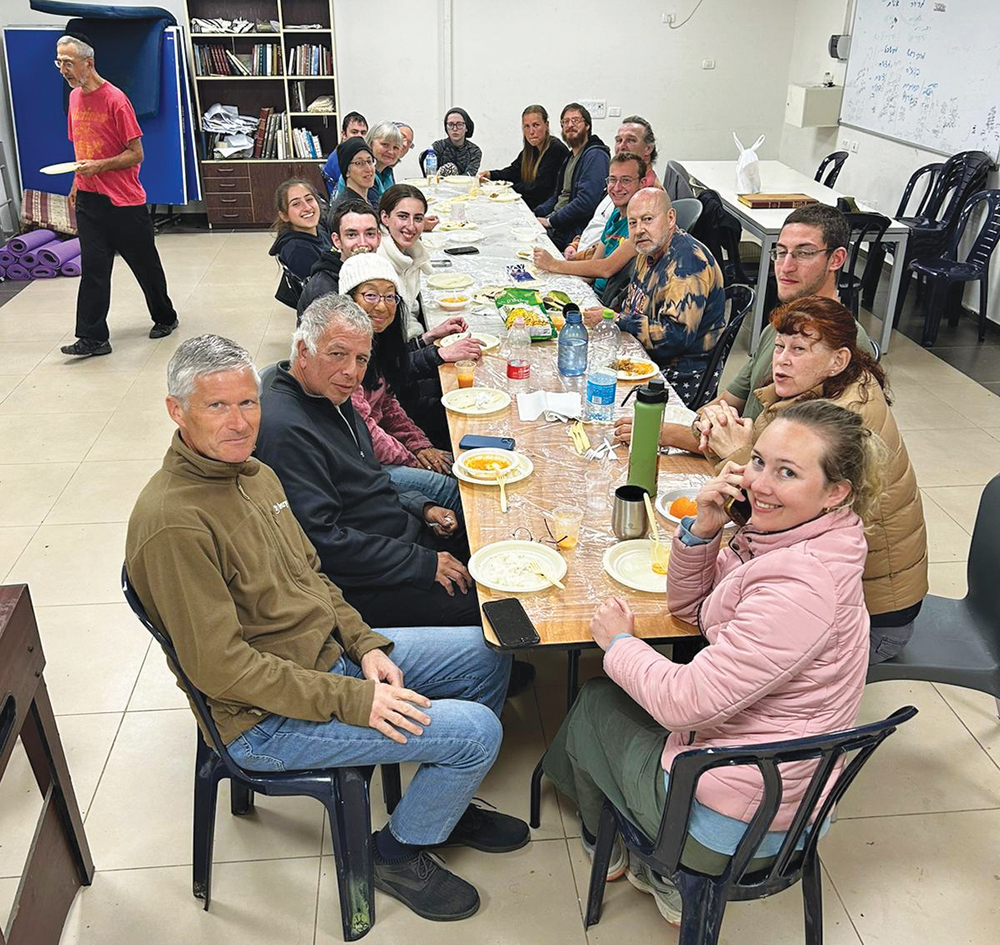
Nestled a mere kilometer from Egypt, a hair’s breadth from Gaza, is a farm of the 120-family community called Bnei Netzarim. Bnei Netzarim was actually a transplant community that came from the original Netzarim, a settlement town that had to relocate from Gush Katif several years ago, forced from their homes unwillingly, their wails piercing the hearts of the soldiers who escorted them out. They eventually rebuilt themselves, inhabiting the precarious parcel of land in a complicated area.
After Oct. 7, when many of the farm employees left in fear or were told to leave by the government, the farm was hurting for help, desperate for people to harvest and plant and keep the operation functioning, as well as to provide produce for Israelis to recoup the millions of dollars lost by the farm since the tragedies occurred.
Recognizing that each community was punctured in its own way after the massacre, and that needs for assistance were diverse and also doable, a few stepped up to the plate to help out Bnei Netzarim. Among them were Avi Kleiman and David Siegel, two men with full-time, professional careers, living miles away from the location. They each separately found a way to clear the space in their lives to invest in the renewal of this farm, selflessly dedicating hundreds of hours to the rebirth of this gem in the south, for no reason other than to give.
Kleinman, an Efrat native, travels one or two days a week from his home to the farm, which is over two hours away from the center of the country. The farm is far for many visiting from overseas who are staying in central Jerusalem, and so Bnei Netzarim offers to house and feed those who volunteer from Sunday-Thursday. Originally there was no cost to stay and eat, but as funding has been worn thin there are now suggested donations in place to continue the operation.
The dorms can sleep hundreds, but most rooms are currently being used as a makeshift army base, and there is also a midrasha on premises. Kleinman is often on-site, coordinating the groups of up to 25 volunteers on any given week, taking them among the 35 greenhouses on the location, teaching them farming techniques, and often working alongside them to build value together. The volunteers share the simple rooms and eat together in a dining room, often ending work when the sun goes down. In the evenings, people relax, socialize, visit the nearby site of the Nova festival, or make pizza for soldiers at a local store.

Siegel, from Teaneck, is the hero who selflessly donates hours of his time coordinating each week’s 25 participants, assisting them in negotiating all of the details to plan and execute a safe arrival and meaningful stay on the farm. Siegel actively recruits people from all over the world, Jewish and non-Jewish alike, from locations as far as Hong Kong and Slovakia. While this work has become almost a full-time volunteer job, Siegel meticulously balances his other obligations and feels extremely fulfilled to be able to make such a behind-the-scenes impact for Bnei Netzarim. Just as many men in Israel have moved away from their usual jobs to serve the country as reservists in the army, Siegel also feels as if he is doing his part from afar.
It began when Siegel visited Israel shortly after Oct. 7 and found himself volunteering wherever he could. He had heard about Bnei Netzarim, but pressed with the decision to either fly home and attend the once-in-a-lifetime rally in Washington, or stay on and work the farm, he opted to return home and planned to spend time at the farm in the near future.
Having once read the books, “The Settlers” and “Oh, Jerusalem,” that depict the early days of the idealistic Zionist pioneers who physically toiled to build up the country agriculturally and also worked tirelessly to establish the land as a Jewish state, Siegel had always yearned to be a part of growing and establishing the home of the Jewish people. These moments felt like a historic time period in the history of the state of Israel, and connecting with the ancient parts of his soul the fragments that may have once fought hard for the land and still had it within him to physically build. Siegel leaned in and connected with the farm management. He learned about the tremendous impact the volunteers were able to make and decided to spread the word to others, in order to assist the farmers who remained there, struggling.
Years ago, Kleinman and his family had also lived in Gush Katif prior to the expulsion. Enmeshed in his beliefs is the connection to the ideological settlers, to develop the land in order to make it the land of the Jewish people. Buried deep within him is the desire to return to the versions of one’s older, more elusive selves, the ancestral portions in one’s souls that find pleasure in the simplicity of working the land.
It is a return to what once was an escape from the emotionally complex world of today in exchange for more physical, routine work. Farming has rooted within it a deep meaning; it is the cultivating of something from almost nothing, the witnessing of beautiful growth, and the ability to enjoy the physical rewards from the fruits of the labor. The calm, repetitive cycle is something a desk job or a fast-paced office atmosphere simply cannot replicate. And truly, it is the planting of seeds for the immediate and foreseeable future, sustaining the land and the people of Israel. There is no holier work.
The farmers are fighting their own battles, but have demonstrated to the country their inner and external strengths. They have weathered the storm, the intent by Hamas to destroy the country’s agriculture as well. They will be victorious; they are victorious. Each day, hope blossoms in conjunction with the volunteers who arrive and are eager to help, partnering with them in their mission to see the land of Israel flourish.
Yes, there is monotony in the labor. There is physical exhaustion. There are crops that get destroyed and the occasional moment of bad weather, when the crops are not in the greenhouses, but the opportunity to engage in directly contributing to cultivating the land of Israel, to feeding the inhabitants and being a part of the cycle of growth is something that no other mission can afford. There is a unanimous feeling of satisfaction in those who spend time at the farm, as they feel they have been given a true gift, an opportunity to partake in the work with the entirety of their beings. There is beauty in coming together with people from all over the world, united in the journey, working the earth together under the same sky and sleeping under the same roof. No fancy hotel stay or five course dinner; no museum visit or meaningful speaker will ever fill that niche; that desire to dig, to grow, to build, to awaken the sleeping parts of oneself, to unite, again with the settlers.
To join a week-long volunteer opportunity with Bnei Netzarim or to contribute to the growing costs of keeping this opportunity available, contact David Siegel at djs.siegel@gmail.com.
Sarah Abenaim is a writer, life coach and journaling workshop curator who lives with her husband and kids. To be featured in one of her “Out There, In Here” stories, reach out to her at sarahabenaim@gmail.com or to David Siegel at djs.siegel@gmail.com. To learn more about how you can make an impact in the war effort, check out tinyurl.com/rinat-volunteeringinisrael.









